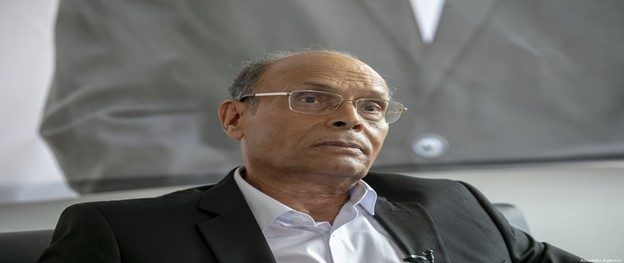
Former Tunisian President Moncef Marzouki described the four-year jail sentence handed to him as “a continuation of tampering”, and stressed that “it means nothing, because it was issued by illegal parties.”
“I can find nothing to say, except laughter and sarcasm. I was not contacted for any court subpoenas, I have not assigned an attorney to defend me, and I have not known anything about the progress of the case, except what I hear today like other people,” Marzouki told Arabi21 after the sentence was passed on Wednesday.
A court sentenced him in absentia on charges of conspiring against state security.
Marzouki pointed out that this is evidence of President Kais Saied’s dominance over the judicial authority. “It is clear through the conduct of this trial, including its accusations and judgement, that all are politicised, which means that there is an attempt to return Tunisia to a worse square than it was in the era of [former dictator Zine El Abidine] Ben Ali, against which the Tunisians revolted.”
He added: “This ruling does not mean anything to me, and I will deal with it as if it does not exist. I will not appeal it, I will not assign any attorney to do so, tomorrow I will start a hunger strike with a number of politicians and activists in opposition to the coup, and in order to return to the democratic path.”
“There is no alternative before the Tunisian people but to struggle in order to end this coup, and to continue in the path of democratic transition.”
Marzouki, who currently resides in the French capital Paris, accused current Tunisian President Kais Saied of staging a coup in July after the latter announced he was suspending parliament, fired the prime minister, and arrested officials.
Saied has rejected the accusations, claiming that he was acting to end protracted political paralysis and that a referendum will be held next year on a new constitution, followed by parliamentary elections.
In early November, a judge in charge of the case issued an international arrest warrant for Marzouki.
Marzouki was elected by an elected assembly as the interim president of Tunisia in 2011 after the revolution which overthrew Ben Ali.
3 parties accuse Saied of pressuring judiciary
Three Tunisian parties on Wednesday accused incumbent President Kais Saied of pressuring the judiciary to intimidate political opponents, Anadolu reports.
On 22 December, a Tunisian court sentenced former President Moncef Marzouki, 76, to four years in prison in absentia on charges of “attacking external state security”.
“The systematic violation of rights and freedoms by continuing to try civilians before military courts and putting pressure on the judiciary is an attempt to use it to intimidate political opponents,” said a joint statement by the Democratic Current, the Republican Party and the Democratic Forum for labor and Freedoms.
Last month, Tunisian authorities issued an international arrest warrant for Marzouki over his criticism of holding the International Francophonie Summit in Tunisia on 15 October.
Speaking on France24’s Arabic channel, Marzouki said he tried to prevent the summit from being held in Tunisia as he believed it would support “the coup”, referring to the seizure of near-total power by Saied.
Marzouki, who was president from 2011 to 2014, also accused Saied of dividing the Tunisian people. In response, the Tunisian president threatened to withdraw diplomatic passports from everyone who solicits outside support to “hit” Tunisian interests.
The three parties also condemned “the repeated appearance of bloggers before courts, and the issuance of freedom-restricting verdicts against them.”
They also declared solidarity with blogger Mariem Bribri, “who was sentenced to a shocking prison term,” according to the statement.
On Tuesday, the Court of First Instance in Sfax city slapped Bribri with a four-month jail term and a fine of 500 dinars ($173), in a lawsuit filed by the Internal Security Forces Syndicate for publishing a video clip documenting an attack by security forces on a citizen in the eastern Nabeul province in October 2020.
The three parties expressed their “rejection of the continued convulsive speech of the head of the de-facto authority, his division of Tunisians and his distortion of the opposition and its symbols.”
They also called on “all democratic and civil forces to unite efforts to defend democracy and protect the state from disintegration.”
Saied ousted the government on 25 July, suspended parliament, and assumed executive authority. While he insists that his “exceptional measures” are meant to “save” the country, critics have accused him of orchestrating a coup.
Saied, who began a five-year term in 2019, rejects accusations that he suspended the work of the Constitution, arguing that he took exceptional measures within the framework of the Constitution to protect the state from an “imminent danger.”
Ennahda slamming sentence against ex-president
Tunisia’s Ennahda has condemned the prison sentence issued against former President Moncef Marzouki, describing it as the “cumulation of political trials for those who reject the coup against the constitution and legitimacy”.
On Wednesday, a Tunisian court sentenced Marzouki to four years in jail in absentia on charges of conspiring against state security.
Earlier this year, Marzouki, who resides in Paris, criticised President Kais Saied, saying he staged a coup. He also called on France to end support for the current administration.
On Thursday, the Ennahda movement described the sentence “as a living embodiment of the danger of accumulating powers in the hands of the President of the Republic [Kais Saied] who has been exerting pressure on the judiciary with the intention of subjugating it to liquidate his political opponents.”
Ennahda called on “all honorable judges” to strongly confront this, as it “serves the authority of tyranny and brings the judiciary back to the era of instructions and submission to the executive authority.”
Commenting on the court’s ruling, the Citizens Against the Coup movement condemned the “sham trial and the unfair ruling against Marzouki,” and stressed the need to stop using the judiciary to liquidate Saied’s political opponents.
The movement demanded the release of detainees in connection with the recent peaceful movements, the cessation of all prosecutions against them, the cessation of all military trials, and the cessation of attempting to “implicate the army in the coup d’etat”.
Saied ousted the government on 25 July, suspended parliament, and assumed executive authority. While he insists that his “exceptional measures” are meant to “save” the country, critics have accused him of orchestrating a coup.
Saied, who began a five-year term in 2019, rejects accusations that he suspended the work of the Constitution, arguing that he took exceptional measures within the framework of the Constitution to protect the state from an “imminent danger.”



